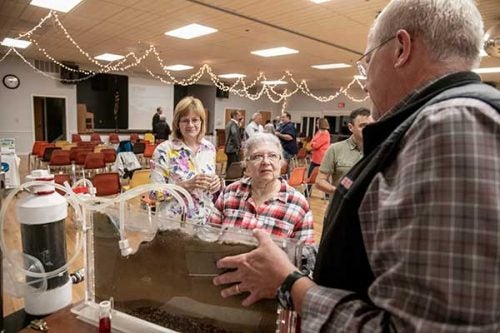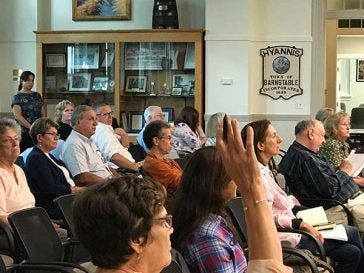

On October 2nd, the URI STEEP’s Community Engagement Core held the annual STEEP Science Day on Cape Cod. A morning session for local high school students included presentations from STEEP researchers Rainer Lohmann (URI Graduate School of Oceanography), Laurel Schaider (Silent Spring Institute), and trainee Alicia Crisalli (URI College of Pharmacy). The session included an interactive display of groundwater flow and overview of remediation activities by Rose Forbes and Doug Karsen of Joint Base Cape Cod and a discussion of municipal water treatment by Hans Keijser, superintendent of the Hyannis Water System. Students were invited to tour the Hyannis Water System PFAS treatment system and 80 teachers and students from five local high schools elected to participate in this session. Afternoon and evening sessions at the Barnstable Town Hall and Yarmouth Senior Center drew an additional 60 actively interested residents. These sessions featured presentations by STEEP researchers on how PFAS move through the environment and adversely impacts human health. Rainer Lohmann provided an overview of PFAS chemistry and the development of passive samplers to measure PFAS in the environment. Laurel Schaider and Alyson McCann (URI Cooperative Extension) presented preliminary findings from STEEP’s private well testing. Angela Slitt (URI College of Pharmacy) discussed toxicological research on PFAS effects on the liver. Carmen Messerlian (Harvard T.H. Chan School of Public Health) discussed the value of medical monitoring to identify early stages of health conditions that are linked to PFAS exposure. Trainee Heidi Pickard (Harvard John A. Paulson School of Engineering and Applied Sciences) discussed PFAS groundwater and surface water fate and transport studies. Following the presentations, Cape Cod residents contributed thought-provoking questions and voiced particular concern about water quality and public health. The result was a bidirectional exchange of ideas, concerns, and commitments to continue an open dialogue.

